40 Common Literary Devices – Flashcards
Unlock all answers in this set
Unlock answersquestion
Alliteration
answer
The repetition of beginning consonant sounds through a sequence of words.
question
Allusion
answer
A reference (either implied or stated) to mythology, the Bible, literature, music, or history that reinforces a point in the current work -- by relying on the reader's familiarity with the alluded-to work.
question
Simile
answer
A comparison using "like" or "as".
question
Connotation
answer
The emotional meaning of a word. Opposite of denotation.
question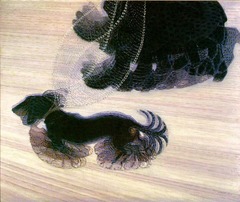
Repetition

answer
Stating the same word, phrase, or sentence over and over again to provide emphasis.
question
Denotation
answer
The literal or dictionary meaning of a word. Opposite of connotation.
question
Metaphor
answer
A comparison between two different things that is stated as a fact.
question
Figurative Language
answer
Creative and imaginative language used to hook readers with meanings that differ from the actual literal meaning of the words themselves. The language broadens a reader's view and offers a new way to connect, or understand.
question
Non-Fiction
answer
A story that is true, or it is based on real life. Example- Dallas Morning News, or a book about Turtles
question
Hyperbole
answer
An extreme exaggeration.
question
Imagery
answer
A picture that the author paints in your head with his/her words. It usually involves at least one of the five senses.
question
Thesis
answer
The controlling statement generally found at the beginning of an essay.
question
Tone
answer
The author's attitude or voice in the story.
question
Personification
answer
To give a non-human object or abstract concept human qualities.
question
Plot
answer
The events that make up a story.
question
Resolution
answer
When a problem is solved, it usually happens at the end of the story. Also known as the conclusion of the story.
question
Persuasive
answer
A type of essay that attempts to influence or convince the reader of their argument. Logos, ethos and pathos are types of ways to persuade.
question
Theme
answer
This can be known as the moral of the story, the life lesson, or the message.
question
Text Evidence
answer
Using quotes from the story to prove your answer.
question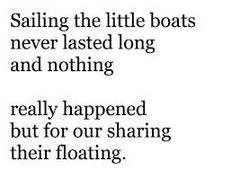
Stanza

answer
A poetry paragraph
question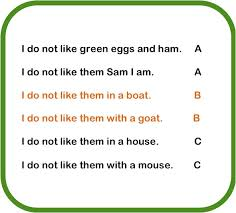
Rhyme Scheme

answer
the arrangement of rhymes in a poem Ex: AABBCC
question
Narrator
answer
The voice that tells the story
question
Point of View
answer
character whose eyes the story is told through.
question
1st Person
answer
Kind of narrator that is: *In the story *Telling their own story *Uses 'I', 'Me', 'My'
question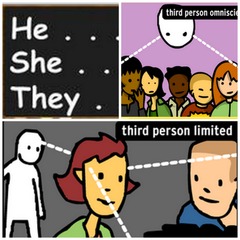
3rd Person

answer
Kind of narrator that is: *Outside the story *Telling someone else's story *Uses 'He', 'She', 'They'
question
Omniscient 3rd Person
answer
*All-knowing point of view *Follows all of the characters Like the director of a movie who already knows what is going to happen.
question
Protagonist
answer
*The main character in a story, play or novel *Involved in the main conflict of the story *Usually undergoes a change *Good guy
question
Antagonist
answer
*Against the protagonist *Causes the conflict *Bad guy
question
Internal Conflict
answer
Mental or emotional struggle of a character
question
External Conflict
answer
struggles against a force outside themselves such as nature, a physical obstacle, or another character
question
Characteristic
answer
a distinguishing trait about a character
question
Climax
answer
the highest or most intense point in a story; turning point of a story
question
Exposition
answer
another word for introduction of a story
question
Rising Action
answer
where the story begins to escalate;begins after the exposition/ introduction of a story
question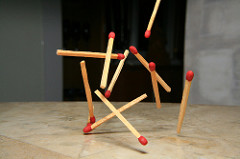
Falling Action

answer
where the conflict begins to calm; where the conflict between the antagonist and protagonist begins to unravel
question
Main Idea
answer
. . . is important information that tells more about the overall idea of a paragraph or section of a text
question
Foreshadow
answer
a suggestion or indication that something will happen in the future
question
Setting
answer
the time, place, and conditions in which the action of a book, movie, etc., takes place
question
Symbolism
answer
A device in literature where an object represents an idea.
question
irony
answer
A contrast between expectation and reality



